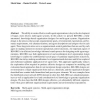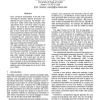287 search results - page 16 / 58 » Guidelines From Organizational Requirements to Formal Specif... |
ER
2005
Springer
15 years 7 months ago
2005
Springer
This paper proposes an agent-oriented meta-model that provides rigorous concepts for conducting enterprise modelling. The aim is to allow analysts to produce an enterprise model th...
109
click to vote
AAMAS
2008
Springer
15 years 2 months ago
2008
Springer
The ability to create effective multi-agent organizations is key to the development of larger, more diverse multi-agent systems. In this article we present KB-ORG: a fully automate...
108
click to vote
CANDC
2007
ACM
15 years 5 months ago
2007
ACM
Collaborative creativity is traditionally supported by formal techniques, such as brainstorming. These techniques improve the idea-generation process by creating group synergies, ...
122
click to vote
ECMDAFA
2008
Springer
15 years 3 months ago
2008
Springer
In requirements engineering, there are several approaches for requirements modeling such as goal-oriented, aspect-driven, and system requirements modeling. In practice, companies o...
124
click to vote
IJCAI
2003
15 years 3 months ago
2003
Noun compound interpretation is the task of determining the semantic relations among the constituents of a noun compound. For example, "concrete floor" means a floor mad...


